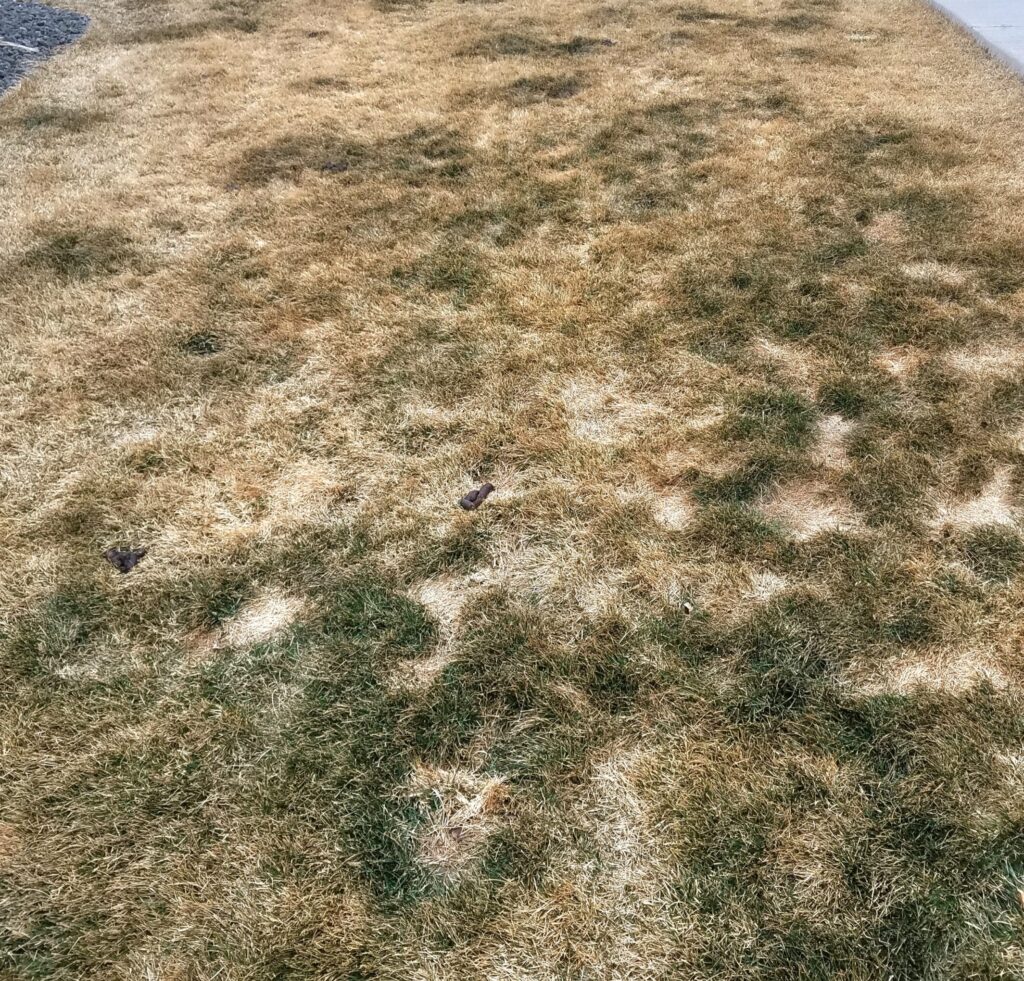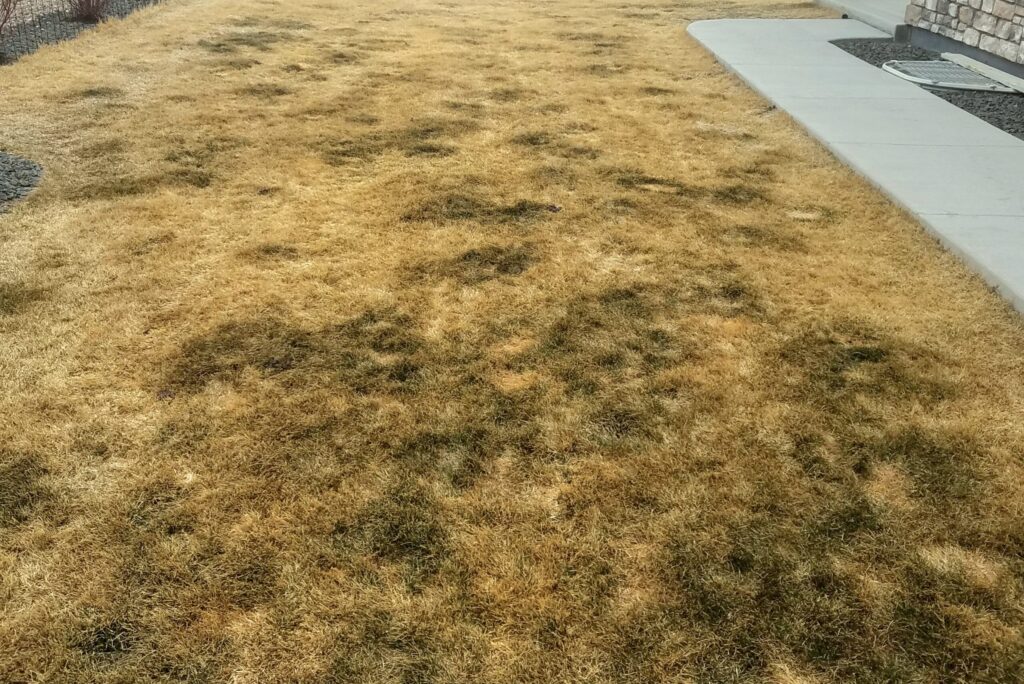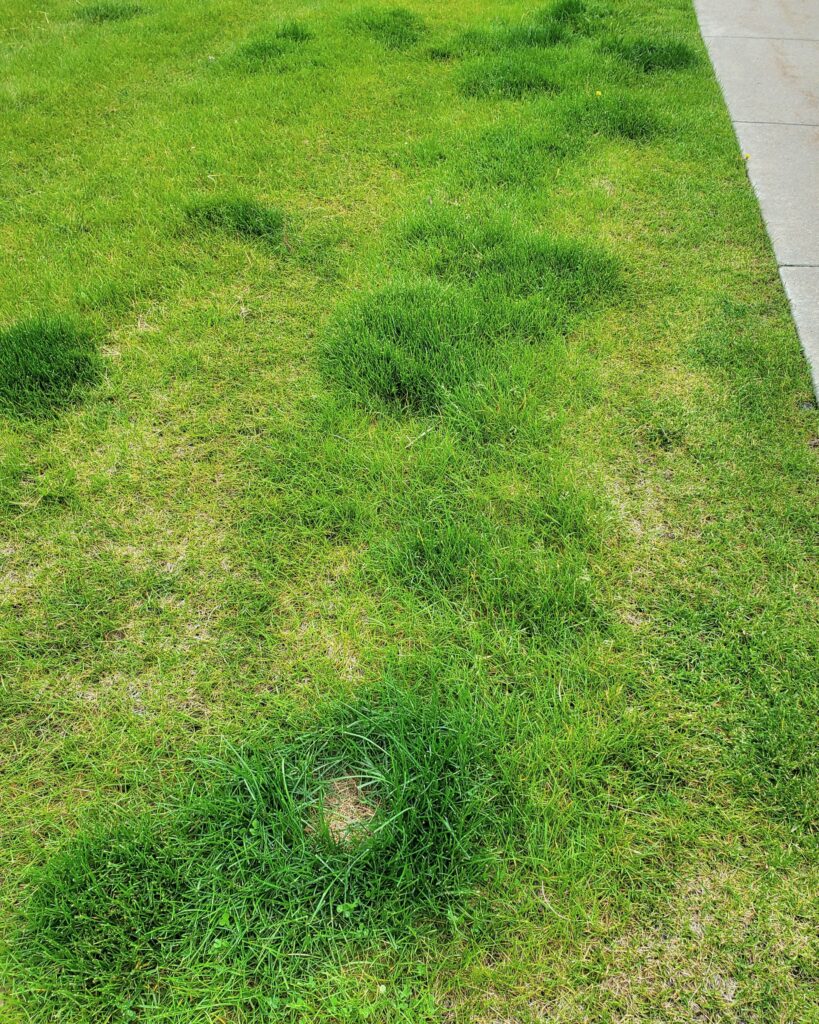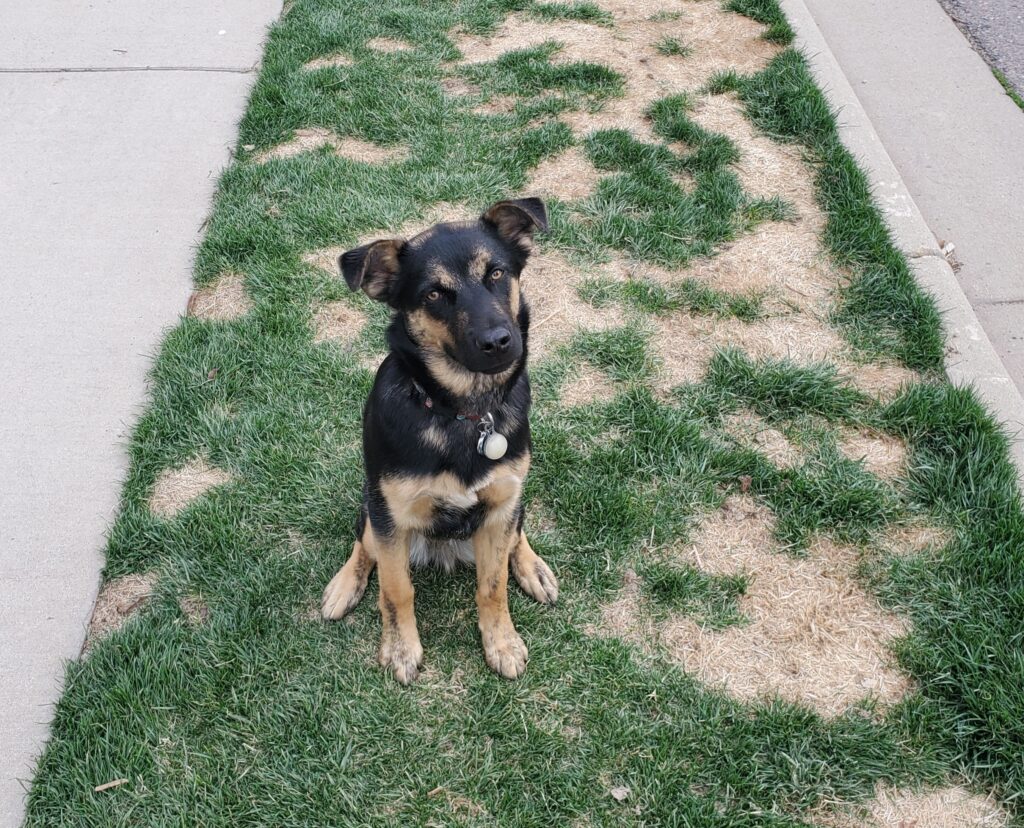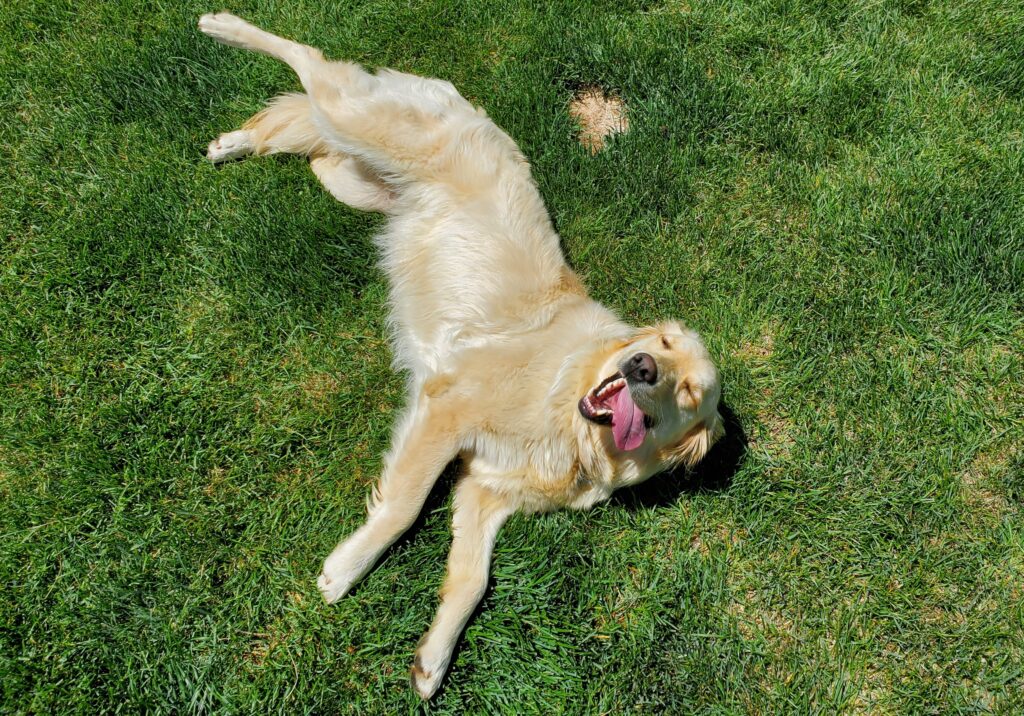DOG PEE DAMAGE AND LAWNS
Why Does Dog Urine Kill Grass?
Nitrogen Burn
Dog urine can cause damage to lawns due to its high nitrogen content. While nitrogen is beneficial for grass in small amounts, the concentrated levels in dog urine can “burn” the grass, leading to brown or yellow patches surrounded by lush, green growth. This phenomenon is sometimes called “urine burn.”
High Protein Diets
When it comes to our furry friends doing their business on the lawn, the main issue stems from the nitrogen in their urine and feces. Dogs need a high-protein diet, which means when they pee, they’re getting rid of excess nitrogen from their bodies. This can vary depending on their size and metabolism, so some pups might leave quite a mark!
Dog Urine Damage
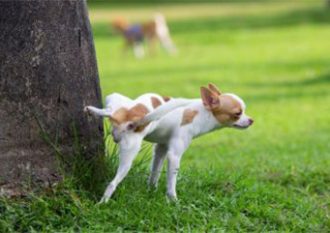
Male vs Female Dogs
Urine can be a bit more troublesome for lawns compared to feces because it comes out all at once, while feces release nutrients gradually. You’ll notice that young puppies usually squat when they go, but by the time they hit about a year old, male dogs often start lifting their legs, whether they’ve been neutered or not. Female dogs can also mark their territory, but they tend to do it less often and usually in smaller amounts, spreading it across a few spots instead of one big puddle.
Volume of Pee Matters
Dr. A.W. Allard, a friendly veterinarian from Colorado, took a deeper dive into how dog urine impacts different types of grass. His studies found that it’s mainly the volume and concentration of the urine that cause the most damage. Other factors, like the pH level of the urine or any additives, don’t really play a big role. So, while our beloved pups love to explore and claim their territory, it’s good to keep in mind how their habits can affect our precious lawns!
Dog Spots in a Lawn
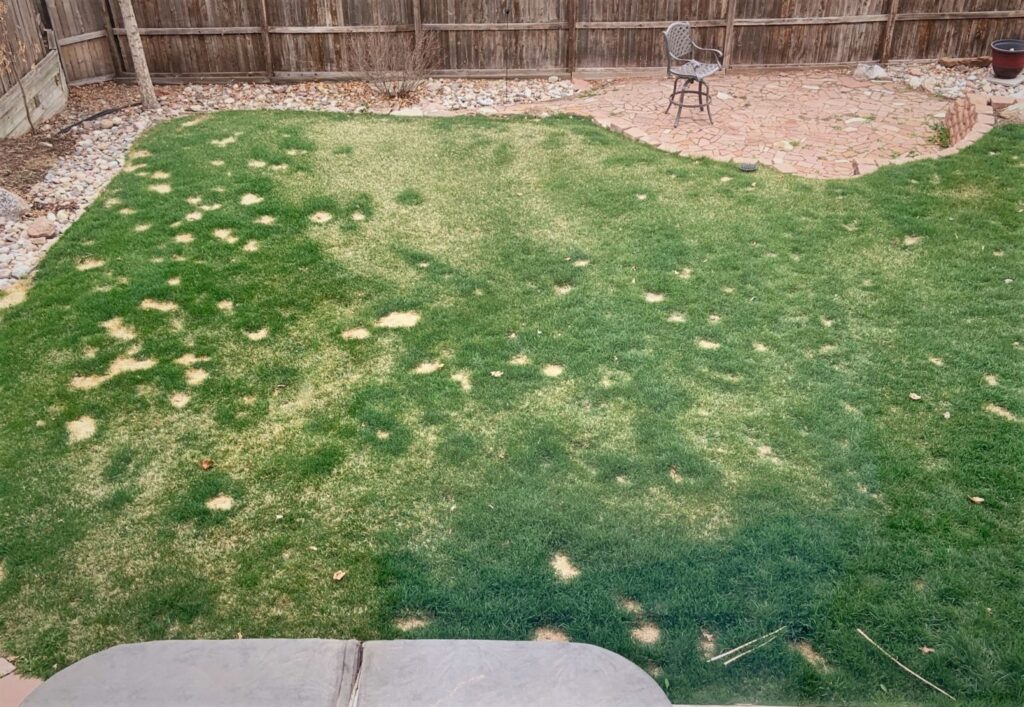
How to Stop Dog Pee Damage in Lawns
Hard to Prevent
Dog urine damage in lawns is hard to prevent because it stems from the natural composition of a dog’s urine, which is rich in nitrogen and other compounds that can overwhelm grass in concentrated areas. Unlike evenly applied fertilizer, the high nitrogen levels in urine act like a concentrated “burn spot,” especially on stressed or weak grass. Additionally, dogs tend to return to the same spots repeatedly, increasing the cumulative damage. Variations in dog size, diet, and hydration also make it challenging to predict or control the impact, while outdoor potty habits can be difficult to retrain, especially in shared or large yard spaces.
Well Established Grass Roots is Key
Deep-digging grass roots help prevent dog urine damage in lawns by creating a more robust and resilient turf. Grass with deep roots can access nutrients and water from lower soil layers, which promotes overall health and growth, allowing the lawn to recover more quickly from high nitrogen levels in dog urine. These roots also improve soil structure and drainage, helping to disperse the concentrated urine and reduce its harmful effects. Strong, healthy grass is less prone to burning and discoloration, making deep-rooted varieties an excellent choice for dog-friendly lawns. Regular aeration and proper watering encourage deeper root systems.
Deep Digging Grass Roots
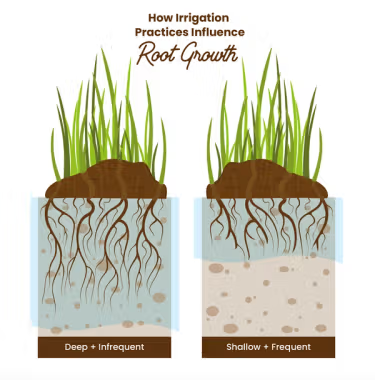
Factors That Make Some Dog Spots Worse Than Others
Higher Nitrogen Concentration
The primary cause of damage is nitrogen, a natural component of urine, and too much can harm the grass.
pH Levels
Some believe urine pH can affect the soil, but this plays a less significant role compared to nitrogen.
Frequency and Location
Repeated urination in the same spot exacerbates the problem.
Dog Size and Diet
Larger dogs and those with high-protein diets may produce urine with higher nitrogen content.
Root Depth
Probably the best defense against dog urine damage is the depth and health of the lawns root system.
Severe Dog Spot Damage
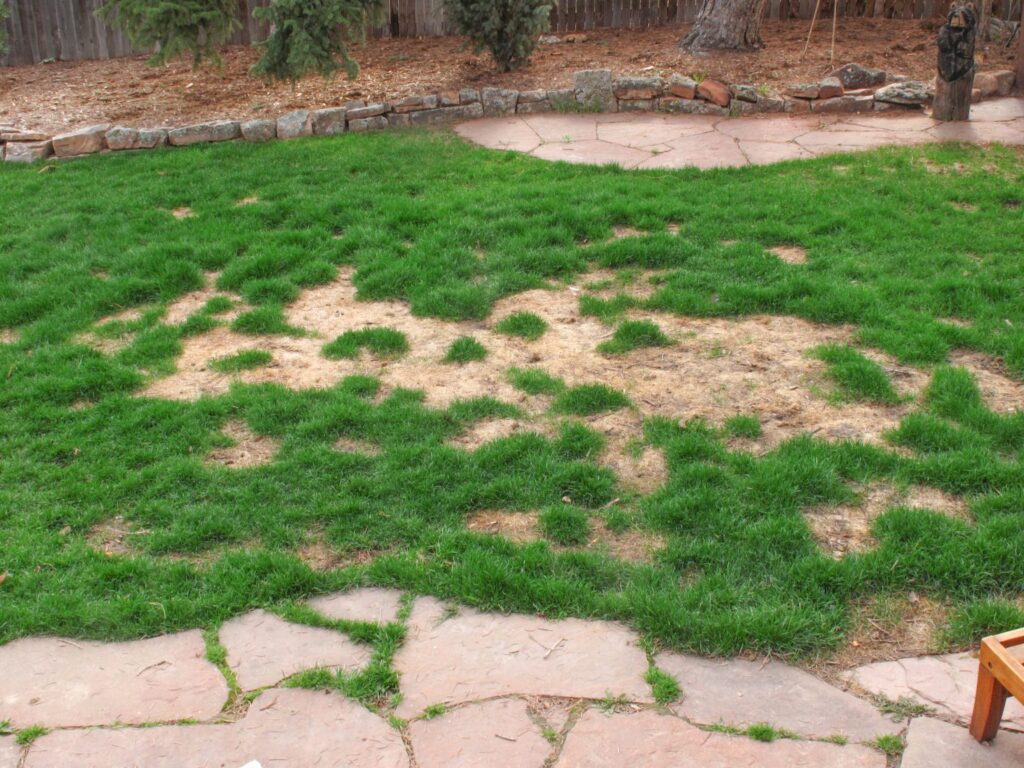
Short Term Prevention and Remedies
Water the Area
Pour water over the spot immediately after your dog urinates to dilute the nitrogen and minimize damage. This is not feasible for most dog owners, but it does work.
Train Your Dog
Designate a specific area for your dog to urinate, such as a gravel patch or mulched zone, to protect the rest of the lawn.
Watering Immediately After the Dog Goes Pee
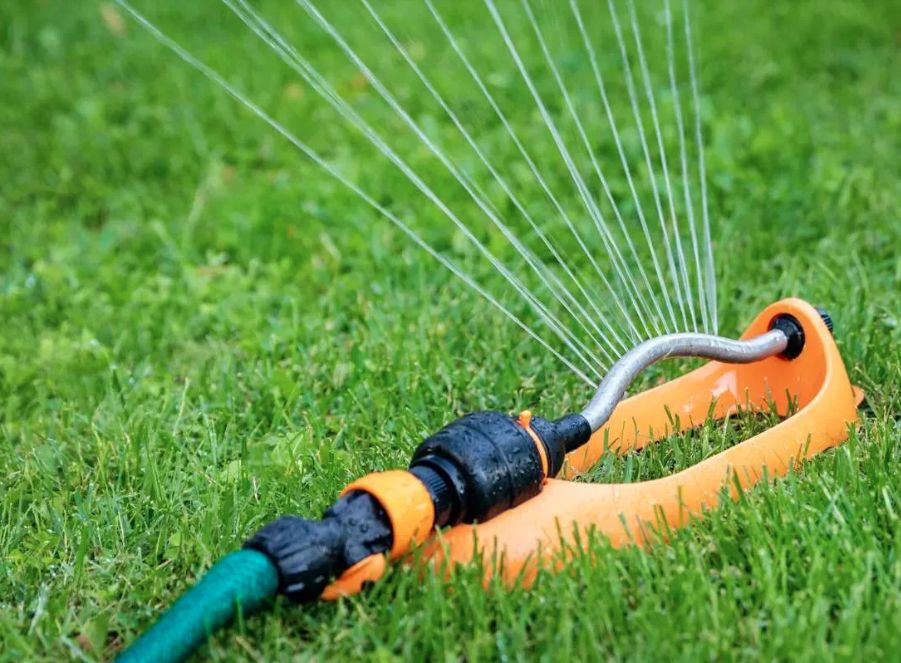
Longer-Term Solutions
Adjust Fertilizer Use
Instead of using chemical fertilizers which are comprised of fast release nitrogen, use 100% organic fertilizers which are comprised of slow-release nitrogen. Since dog urine is also fast release nitrogen the combination of dog urine and chemical fertilizers creates a double whammy to the lawn.
Promote Deep Digging Grass Roots
The most effective defense against nitrogen burns is deep digging and well-established grass roots. To accomplish this in a lawn it is important to water deeply and infrequently which trains the roots to dig deep into the soil. Following the 1-2-3-2-1 lawn watering technique is the ideal way to train grass roots to grow deep.
Big Dog and a Small Lawn
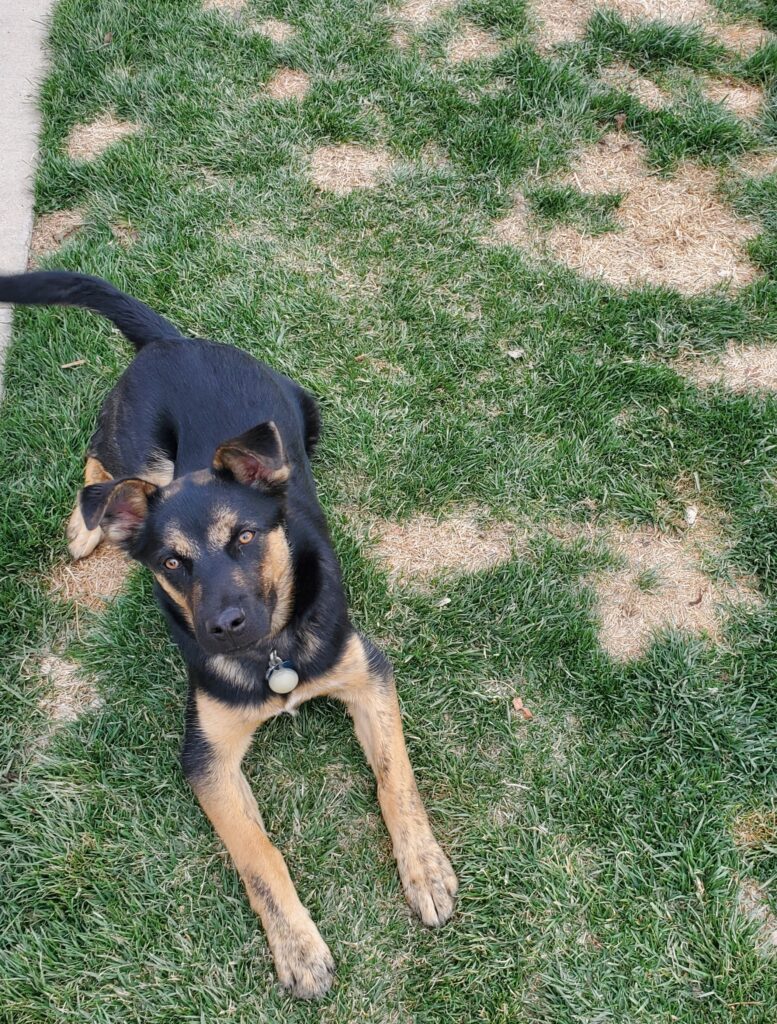
Repairing the Damaged Grass
- Rake out dead grass.
- Apply a thin layer of topsoil.
- Reseed the area with grass seed.
- Water regularly until the new grass establishes.
- Switching Grass Types: Some grass types, like fescue and ryegrass, are more resistant to urine damage than others.
Unless you are willing to get rid of the dog the best way to minimize dog urine damage is by taking proactive measures and addressing the underlying causes.
Seeding a Damaged Area
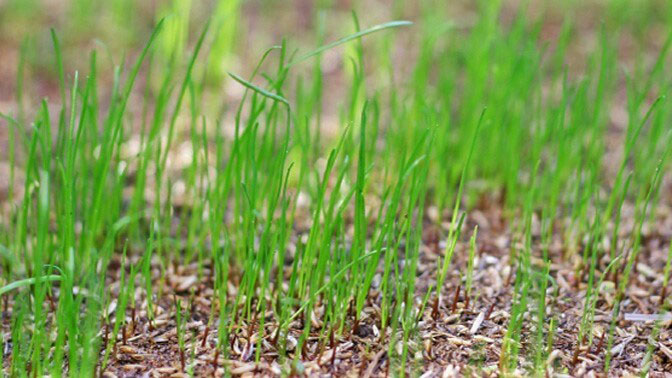
What Grass Type can Tolerate Dog Urine the Best?
Fescue and Perennial Ryegrass
Fescue and Perennial Ryegrass are the top choices for dog owners! If you’re interested in the best grass for your furry friend, certain types excel in managing dog urine due to their deep root systems. Research indicates that Fescue and Perennial Ryegrass are the most resistant to urine damage. In fact, diluted dog urine can even serve as a fertilizer for these grasses, promoting healthier growth!
What About Other Grass Types?
On the other hand, Kentucky Bluegrass and Bermudagrass are quite sensitive and can suffer from significant damage that lasts for over 30 days, even with a small amount of diluted urine. Interestingly, while fescue is the hardiest among them, the concentration of urine is more critical than the volume; just one ounce of concentrated urine can lead to problems.
If you want to maintain a healthy lawn while accommodating your dog, Fescue and Perennial Ryegrass are likely your best options!
Tall Fescue
Tolerates Dog Urine
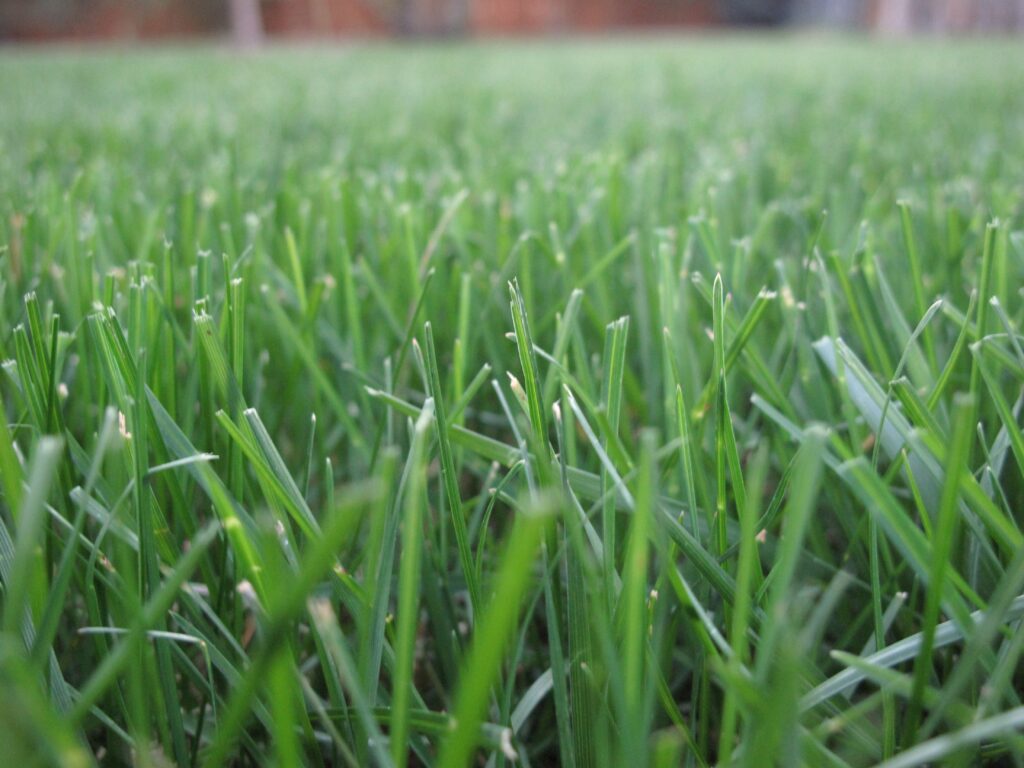
The Best Way to Prevent Dog Urine Damage
How to Promote Deep Digging Roots
Step #1
Water the lawn according to the 1-2-3-2-1 lawn watering technique.
Step #2
Mow the lawn tall – grass roots will grow up to 3 times as deep as the lawn is mowed tall. Mowing the lawn at 3 inches will promote grass roots to grow up to 9 inches deep.
Step #3
Core Aeration – Soils that are compacted are more difficult to penetrate. Loose soils allow grass roots to grow more easily.
Puppy Fun
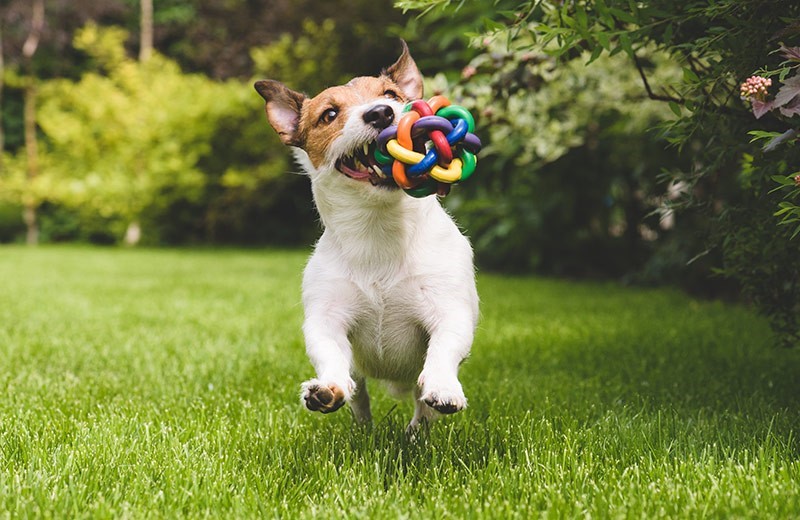
Do Vitamins or Supplements Stop Urine Damage in Grass?
Maybe or Maybe Not?
Some pet supplements and vitamins are marketed to reduce dog urine damage in lawns, but their effectiveness is often limited or unproven. Here’s a breakdown of the claims, potential impacts, and what you should consider:
Common Types of Supplements
pH Adjusters
Supplements claiming to change the pH of a dog’s urine (such as cranberry or apple cider vinegar products) are typically ineffective. Lawn damage is primarily caused by nitrogen concentration, not pH.
Nitrogen Neutralizers
Some products contain compounds like yucca extract or enzymes designed to bind or neutralize nitrogen in the urine. These may slightly reduce the impact but won’t eliminate damage entirely.
Dietary Additives
Some supplements include ingredients that promote increased water intake, diluting the urine naturally. While this can help, similar effects can often be achieved by ensuring your dog drinks plenty of water.
Health Concerns
Some ingredients in these supplements may not be safe for all dogs, particularly those with underlying health conditions like kidney or bladder issues. Over-supplementation can lead to nutrient imbalances or gastrointestinal issues.
Ask a Veterinary
Always consult a veterinarian before giving your dog any supplement, as some can cause more harm than good.
Conclusion
While some supplements may slightly reduce the damage caused by dog urine, they are not a guaranteed or comprehensive solution. A combination of proper lawn care, hydration, and dietary balance is typically more effective and safer for your dog. Always prioritize your dog’s health and consult with a veterinarian before trying any new product.
Suppliments
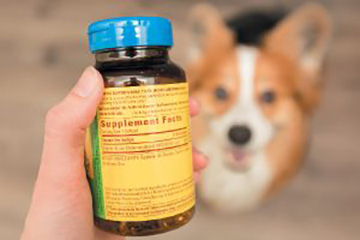
Dog Spots
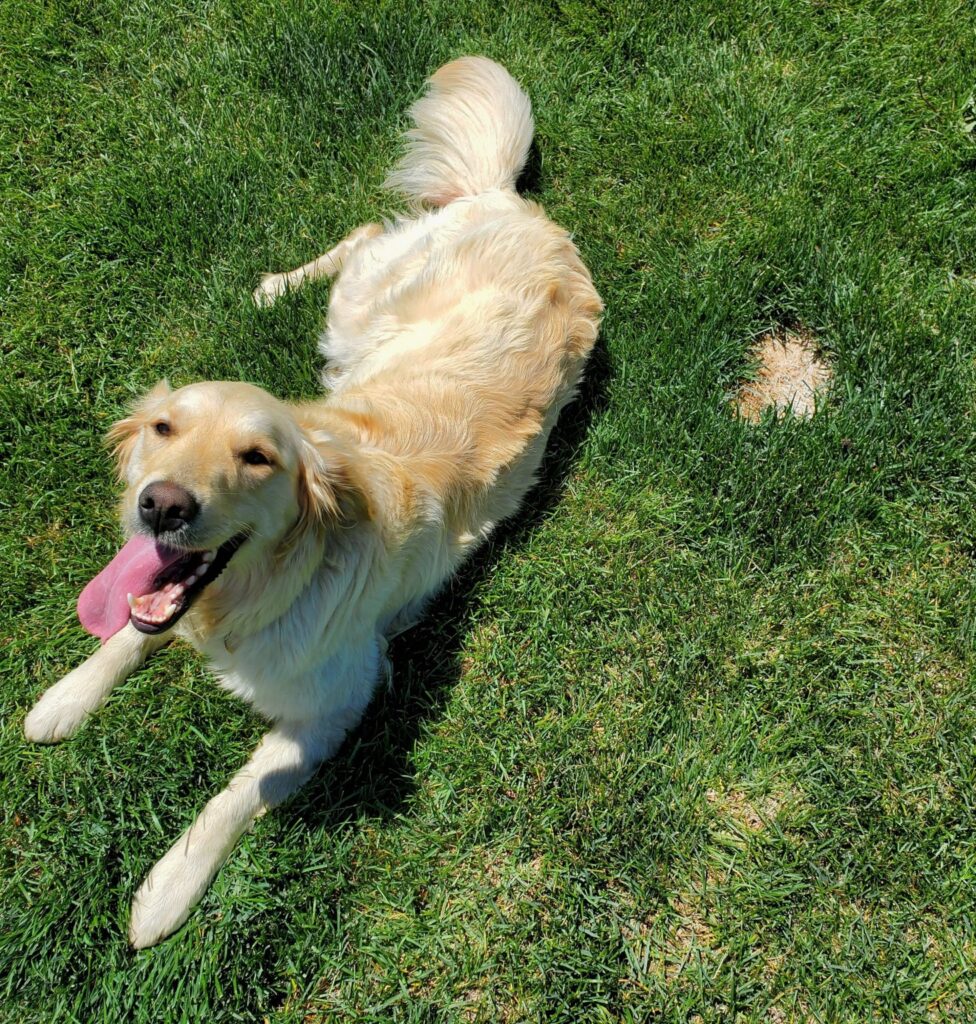
Does Feeding Your Dog Tomato Juice Stop Dog Pee Damage to Grass?
Tomato Juice
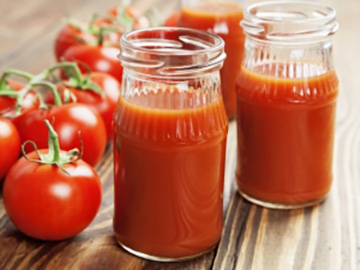
Indirectly, Yes!
Strangely tomato juice can work but only because it helps increase liquid intake. Dog owners often find that getting their pets to drink more water helps manage urinary issues by diluting their urine. You can encourage this by feeding canned food, adding water to dry food, or sprinkling a little salt or garlic salt on their meals.
Keep in mind that while a small amount of salt can help, too much can be harmful for dogs with kidney or heart problems. Always consult your vet before making dietary changes.
Diluted Urine
If your dog’s urine is more diluted, they may need more bathroom breaks. Smaller dogs typically urinate less than larger breeds. If your dog has a bladder infection, they may urinate frequently and only pass a small amount at a time, which can be gentler on your lawn.
Does Changing a Dog’s Food Reduce Dog Urine Damage?
Protein Content Matters
Yes, changing your dog’s food can help reduce lawn urine damage, but the impact depends on the specific composition of the new diet. The key is to address factors like nitrogen concentration and overall urine composition, which are influenced by the type and amount of protein in the food, as well as the dog’s hydration levels.
Changing a dog’s food can reduce urine damage in lawns by altering the composition of the urine, particularly its nitrogen content. High-protein diets often lead to excess nitrogen in urine, which can burn grass. Additionally, some specially formulated dog foods are designed to support urinary health and reduce the acidity of urine, making it less harmful to grass. Always consult a veterinarian before making dietary changes to ensure the new food meets your dog’s nutritional needs while helping to protect your lawn.
Dog Food Brands
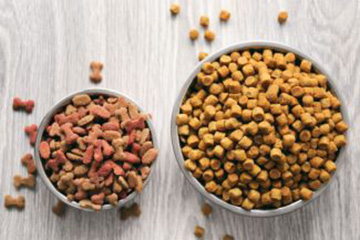
How Your Dog’s Diet Affects Urine and Lawn Damage
High Protein Dog Foods
- Protein in your dog’s diet breaks down into nitrogenous waste products like urea, which are excreted in urine.
- High-protein diets result in more nitrogen in urine, increasing the risk of lawn “burn.”
- Switching to a dog food with moderate protein levels (appropriate for your dog’s size, age, and activity level) can reduce nitrogen output.
Salt Levels
- Some dog foods contain higher levels of salt, which can increase thirst and lead to diluted urine. While this might help reduce lawn damage, unnecessarily high salt intake is not healthy for dogs, especially those with kidney or heart issues.
Additives and Nutritional Balance
- Some specialty foods include additives like yucca extract, which may reduce the nitrogen smell and slightly neutralize its impact.
- A well-balanced diet with high-quality ingredients supports overall urinary health, reducing the risk of urine-related lawn damage.
Dietary Changes?
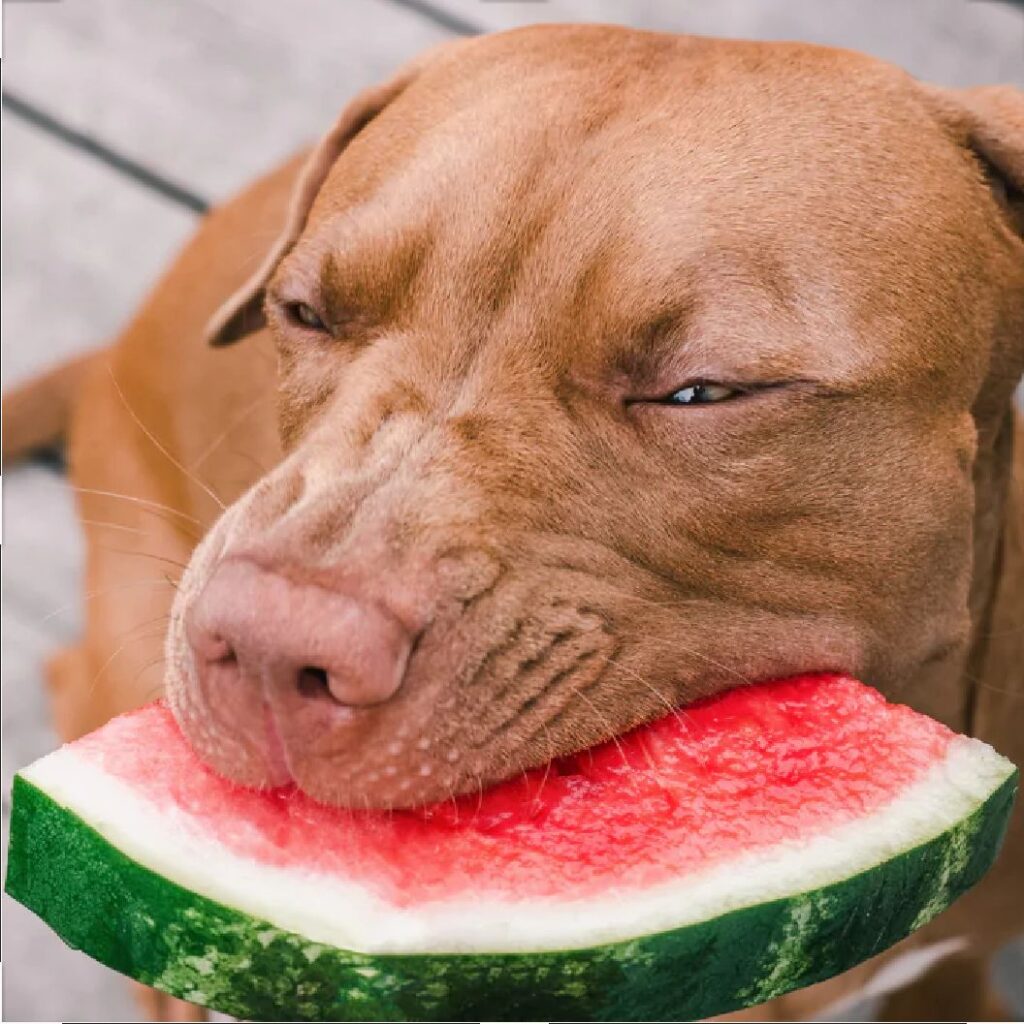
A Closer Look at Dog Urine Damage
Severe Dog Urine Damage!
Organic Lawn Care for Pet Owners
(303) 499-2000 Boulder or (970) 225-9425 Fort Collins.
Dog Urine Damage in Lawns FAQs
Factors such as urine concentration, diet, hydration levels, and the size of the dog impact the severity of lawn damage. Female dogs and larger breeds tend to cause more noticeable spots because they often urinate in one concentrated area.
- Water affected areas deeply to flush out excess nitrogen.
- Reseed or patch with sod if the grass is completely dead.
- Apply organic fertilizers to promote healthy regrowth.
The nitrogen in dog urine can act as a fertilizer at lower concentrations, causing the grass around the damaged area to grow greener and healthier.
- Train the grass roots to grow deep into the soil.
- Use organic fertilizers.
- Choose urine-resistant grass varieties.
- Create a designated potty area with non-grass surfaces.
